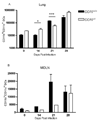Ectopic activation of Mycobacterium tuberculosis-specific CD4+ T cells in lungs of CCR7-/- mice
- PMID: 20007536
- PMCID: PMC2879893
- DOI: 10.4049/jimmunol.0901230
Ectopic activation of Mycobacterium tuberculosis-specific CD4+ T cells in lungs of CCR7-/- mice
Abstract
Initiation of an adaptive cellular immune response depends on intimate interactions with APCs and naive T lymphocytes. We previously reported that activation of naive Mycobacterium tuberculosis-specific CD4+ T cells depends on dendritic cell (DC) transport of live bacteria from the lungs to the mediastinal lymph node (MDLN). Because the migratory paths of DCs are largely governed by the chemokine receptor CCR7, which is expressed on DCs upon maturation by proinflammatory stimuli, we examined the quantitative contribution of CCR7-dependent DC migration in the context of tuberculosis. We found that early trafficking of DCs from the lungs to the MDLN depended on CCR7-mediated signaling, but alternative mechanism(s) are used later in infection. Impaired migration of DCs in CCR7(-/-) mice resulted in delayed dissemination of bacteria to MDLN and spleen and in delayed kinetics of activation of adoptively transferred Ag85B-specific CD4+ T cells. Furthermore, in contrast to control mice, we found that naive Ag85B-specific CD4+ T cells are activated to proliferate in the lungs of CCR7(-/-) mice and, when infected with higher doses of bacteria, resistance to M. tuberculosis infection in CCR7(-/-) mice is compromised compared with wild-type mice.
Figures





References
-
- Winslow GM, Roberts AD, Blackman MA, Woodland DL. Persistence and turnover of antigen-specific CD4 T cells during chronic tuberculosis infection in the mouse. J Immunol. 2003;170:2046–2052. - PubMed
Publication types
MeSH terms
Substances
Grants and funding
LinkOut - more resources
Full Text Sources
Medical
Molecular Biology Databases
Research Materials
Miscellaneous

